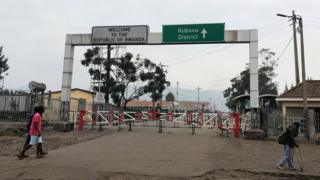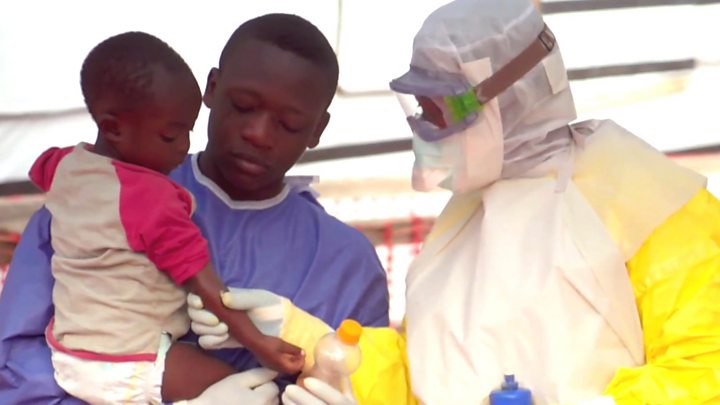Rwanda shuts DR Congo border amid Ebola crisis
Rwanda has closed its border with DR Congo in response to the Ebola crisis.
At least two people have died from the virus in the eastern Congolese city of Goma, near the Rwandan border.
It is one year today that DR Congo declared what has become its worst outbreak, with more than 1,800 people dead and over 2,700 infected.
The outbreak is the most complicated ever as it is happening in an active conflict zone, BBC Africa correspondent Anne Soy says.
Immigration sources in Rwanda said the border crossing point at Goma was shut on Thursday morning. This was later confirmed by DR Congo officials.
In a statement, the Congolese presidency said there had been a “unilateral decision by the Rwandan authorities” to close the crossing.
Earlier this week an artisanal miner became the second person in Goma to be killed by the disease.
He came from the north-eastern province of Ituri and had been admitted to a health centre in Kiziba, on the outskirts of Goma, on 13 July.
He later developed symptoms of bleeding and bruising, and tested positive to Ebola on Tuesday. He died on Wednesday morning.
AFP news agency has also reported that a third person – believed to be the miner’s daughter – died afterwards.
Last week, the World Health Organization designated the outbreak a global health emergency.
It is the highest level of alarm the WHO can sound and has only been used four times previously – including during the Ebola epidemic that devastated parts of West Africa from 2014 to 2016, and killed more than 11,000 people.
What is the situation in Goma?
Ebola is affecting two provinces of DR Congo – North Kivu and Ituri. Goma is the capital of North Kivu and lies just across the border from the Rwandan city of Gisenyi.
Until now, the virus has been mostly contained to more remote areas, mostly around Beni and Butembo, to the north of Goma.
Fifteen people in South Kivu province are reported to have been quarantined amid fears the virus is spreading further.
A priest in Goma died from Ebola earlier this month.
Goma is a transport hub so the latest death is of particular concern, as it is far harder to isolate patients and trace contacts in major cities, where highly mobile, large populations are living in close proximity.
There are fears the illness could spread into Rwanda as people travel between Goma and Gisenyi every day.
Although Rwanda has not yet had any confirmed cases, it has set up an Ebola treatment centre and is preparing 23 isolation centres in case of any infections.
“Rwanda has made a significant investment in Ebola preparedness,” WHO director-general Dr Tedros Adhanom Ghebreyesus said last week.
“But as long as the outbreak continues in the Democratic Republic of the Congo, there is a very real risk of spread to neighbouring countries.”
How bad is the situation in DR Congo?
More than 2,700 people have been infected, 1,700 of whom have died.
It took 224 days for the number of cases to reach 1,000, but just a further 71 days to reach 2,000.
About 12 new cases are being reported every day.
Isn’t there a vaccine?
Yes.
It is 99% effective and more than 161,000 people have been given it.
However, not everybody is vaccinated – only those who come into direct contact with an Ebola patient, and people who come into contact with them.
And some of those people refuse to take it.
People give a variety of reasons for not taking it: they don’t want to put any external liquid in their body; they have a religion that doesn’t want them to take vaccines; they don’t believe in Ebola or because they think they don’t need it.
The vaccine, made by Merck, was developed during the epidemic in West Africa and has been available throughout the latest outbreak.
It has proven effective but is in relatively short supply so WHO recommended a second vaccine made by Johnson & Johnson to complement it.
But the DR Congo’s Health Minister Oly Ilunga complained that the Congolese were being treated as “subjects of experimentation”, reports Reuters, and he resigned over the issue.
Why hasn’t the outbreak been brought under control?
Tackling the disease has been complicated by conflict in the region.
Since January, there have been 198 attacks against healthcare workers or Ebola treatment facilities leading to seven deaths and 58 injuries.
Another major problem has been distrust of healthcare workers leading to about a third of deaths being in the community rather than at a specialist Ebola treatment centre.
It means those people are not seeking treatment and risk spreading the disease to neighbours and relatives.
There has also been difficulty tracking the spread of the virus.
Is the world doing enough to help?
The WHO has been clear for months that it has insufficient money to tackle the problem.
It had estimated that it needed $98m to tackle the outbreak between February and July. Yet it faced a shortfall of $54m.
The UK’s International Development Secretary, Alok Sharma, said he was “proud of our support to create a life-saving Ebola vaccine”.
“Diseases like Ebola have no respect for borders,” he said. “It is essential the rest of the international community steps up to help. If we don’t act now, many thousands more lives could be lost.”
What is Ebola?
Source: Read Full Article




